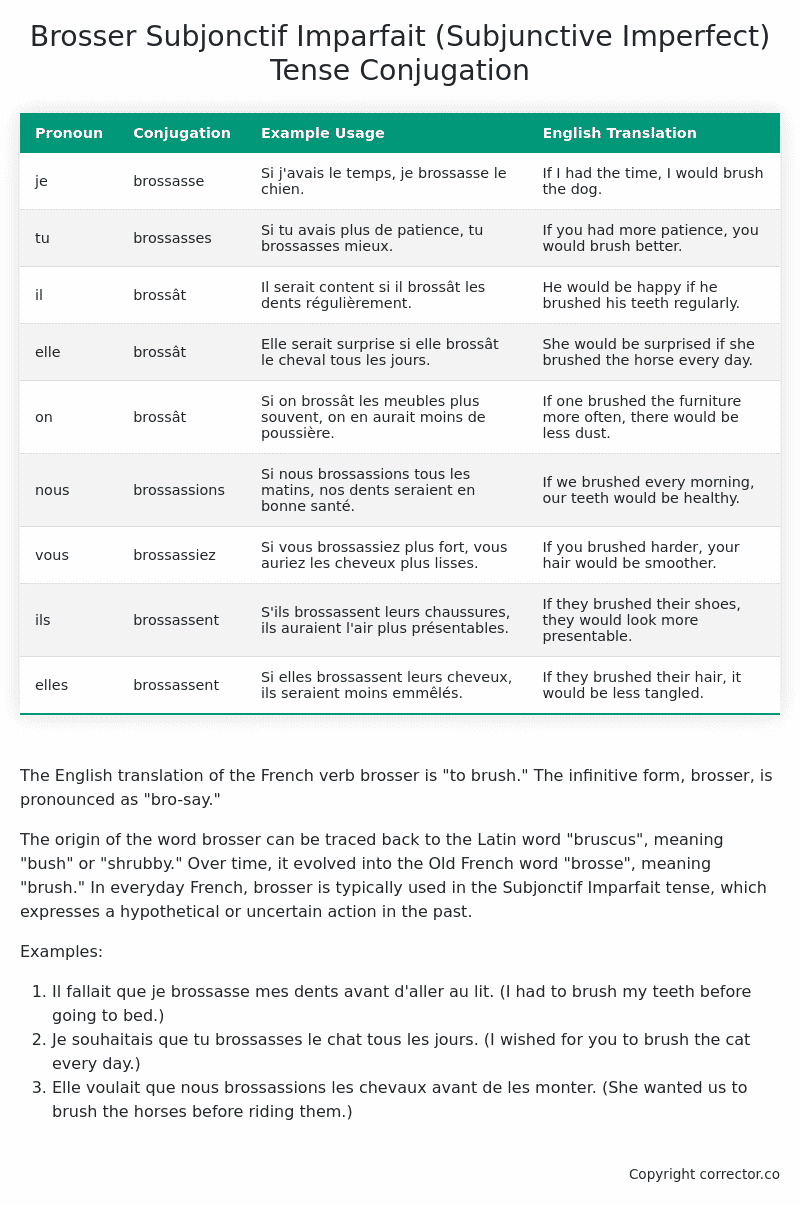Subjonctif Imparfait (Subjunctive Imperfect) Tense Conjugation of the French Verb brosser
Introduction to the verb brosser
The English translation of the French verb brosser is “to brush.” The infinitive form, brosser, is pronounced as “bro-say.”
The origin of the word brosser can be traced back to the Latin word “bruscus”, meaning “bush” or “shrubby.” Over time, it evolved into the Old French word “brosse”, meaning “brush.” In everyday French, brosser is typically used in the Subjonctif Imparfait tense, which expresses a hypothetical or uncertain action in the past.
Examples:
- Il fallait que je brossasse mes dents avant d’aller au lit. (I had to brush my teeth before going to bed.)
- Je souhaitais que tu brossasses le chat tous les jours. (I wished for you to brush the cat every day.)
- Elle voulait que nous brossassions les chevaux avant de les monter. (She wanted us to brush the horses before riding them.)
Table of the Subjonctif Imparfait (Subjunctive Imperfect) Tense Conjugation of brosser
| Pronoun | Conjugation | Example Usage | English Translation |
|---|---|---|---|
| je | brossasse | Si j’avais le temps, je brossasse le chien. | If I had the time, I would brush the dog. |
| tu | brossasses | Si tu avais plus de patience, tu brossasses mieux. | If you had more patience, you would brush better. |
| il | brossât | Il serait content si il brossât les dents régulièrement. | He would be happy if he brushed his teeth regularly. |
| elle | brossât | Elle serait surprise si elle brossât le cheval tous les jours. | She would be surprised if she brushed the horse every day. |
| on | brossât | Si on brossât les meubles plus souvent, on en aurait moins de poussière. | If one brushed the furniture more often, there would be less dust. |
| nous | brossassions | Si nous brossassions tous les matins, nos dents seraient en bonne santé. | If we brushed every morning, our teeth would be healthy. |
| vous | brossassiez | Si vous brossassiez plus fort, vous auriez les cheveux plus lisses. | If you brushed harder, your hair would be smoother. |
| ils | brossassent | S’ils brossassent leurs chaussures, ils auraient l’air plus présentables. | If they brushed their shoes, they would look more presentable. |
| elles | brossassent | Si elles brossassent leurs cheveux, ils seraient moins emmêlés. | If they brushed their hair, it would be less tangled. |
Other Conjugations for Brosser.
Le Present (Present Tense) Conjugation of the French Verb brosser
Imparfait (Imperfect) Tense Conjugation of the French Verb brosser
Passé Simple (Simple Past) Tense Conjugation of the French Verb brosser
Passé Composé (Present Perfect) Tense Conjugation of the French Verb brosser
Futur Simple (Simple Future) Tense Conjugation of the French Verb brosser
Futur Proche (Near Future) Tense Conjugation of the French Verb brosser
Plus-que-parfait (Pluperfect) Tense Conjugation of the French Verb brosser
Passé Antérieur (Past Anterior) Tense Conjugation of the French Verb brosser
Futur Antérieur (Future Anterior) Tense Conjugation of the French Verb brosser
Subjonctif Présent (Subjunctive Present) Tense Conjugation of the French Verb brosser
Subjonctif Passé (Subjunctive Past) Tense Conjugation of the French Verb brosser
Subjonctif Imparfait (Subjunctive Imperfect) Tense Conjugation of the French Verb brosser (this article)
Subjonctif Plus-que-parfait (Subjunctive Pluperfect) Tense Conjugation of the French Verb brosser
Conditionnel Présent (Conditional Present) Tense Conjugation of the French Verb brosser
Conditionnel Passé (Conditional Past) Tense Conjugation of the French Verb brosser
L’impératif Présent (Imperative Present) Tense Conjugation of the French Verb brosser
L’infinitif Présent (Infinitive Present) Tense Conjugation of the French Verb brosser
Struggling with French verbs or the language in general? Why not use our free French Grammar Checker – no registration required!
Get a FREE Download Study Sheet of this Conjugation 🔥
Simply right click the image below, click “save image” and get your free reference for the brosser Subjonctif Imparfait tense conjugation!

Brosser – About the French Subjonctif Imparfait (Subjunctive Imperfect) Tense
Formation
Common Everyday Usage Patterns
Interactions with Other Tenses
Subjonctif Présent
Indicatif Passé Composé
Conditional
Conditional Perfect
Summary
I hope you enjoyed this article on the verb brosser. Still in a learning mood? Check out another TOTALLY random French verb conjugation!


